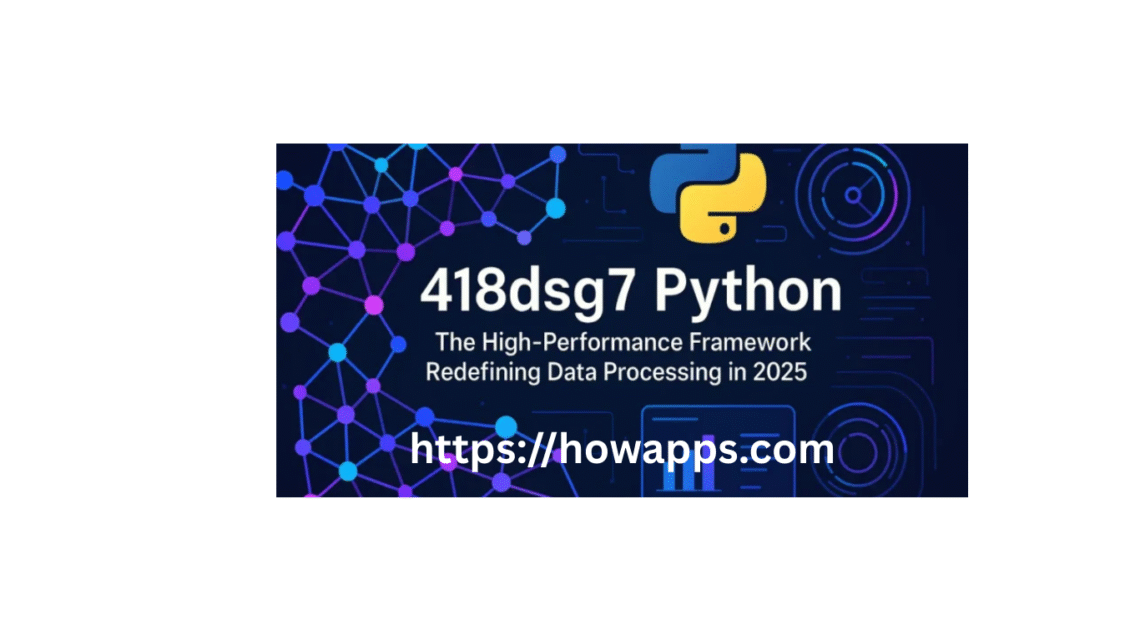Table of Contents
Python is not new to innovation, and in the growing world of modules and tools, 418dsg7 Python has become a much-discussed utility for programmers who wish to make complex tasks easy with a click.
It is basically developed to automate routine tasks, hasten script execution, and offer simple customisation. 418dsg7 Python is admired by developers, automation specialists, and data professionals due to its amazing features.
How can it help you? Let’s scroll down to explore its details.
Task Automation Engine

Among the most striking features of 418dsg7 Python is its in-built task automation engine. It helps developers to automate repetitive workflows such as file handling, system checking, log reading, and API processing without coding hundreds of lines.
Native support for cron-like scheduling from Python scripts
Triggers automation on events or system events
Perfect for DevOps, system administration, and batch processing routines
Smart Data Parsing Tools
Among the core functionalities is its smart data parsing tool. Whether working with JSON, XML, or unstructured logs, 418dsg7 Python possesses built-in parsers that extract meaningful data at lightning speed.
Pattern detection via advanced regex templates
Low memory usage support for large file parsing
Database, CSV, and external API support
This operation is especially beneficial in ETL (Extract, Transform, Load) operations, where raw data need to be transformed into actionable insights.
Asynchronous Task Management
It manages all the tasks related to Python programming and helps to create responsive and speedy applications. Leverage the async functions without any delay or issues because it allows you to run concurrent tasks without getting into backend data.
Lightweight async wrapper for multi-threading and multiprocessing
Simple integration with external data sources and APIs
No boilerplate async/await constructs in the majority of cases
For API creators, data pipelines, or real-time application developers, this is a revelation.
Integrated Debugging and Logging Framework
Debugging occupies much of a developer’s time. With the help of 418dsg7 Python, it makes logging and debugging easier by keeping an eye on the scripts at all times.
Predefined logging templates (debug, info, warning, error)
Real-time error tracing with recommendations
Seamless integration with IDEs and terminal-based workflows
Whether you’re working on production-level code or a simple script, this built-in tool ensures smoother testing and error handling.
Dynamic Configuration System
Flexibility is another strength. The dynamic configuration system in 418dsg7 Python allows scripts to adapt based on environmental variables or user-defined settings.
Use Cases:
Automatically adjust script behavior based on environment (dev, staging, production)
Easily pass external inputs or parameters at runtime
Use YAML, JSON, or INI files to manage configurations
This allows you to write once and deploy on many systems without messing with the core code.
Plugin and Extension Support
Finally, 418dsg7 Python has a modular plugin system that allows you to extend its core functionality. Whether it’s custom handlers, machine learning extensions, or visualization tools, you can plug in what you want and scale features with ease.
- Community-supported plugins
- Build and share your plugins
- Keep your base installation lean and custom
Last to Say
418dsg7 Python is unique in its name and promising in delivering top-notch features. It gives you numerous benefits, such as task automation and data parsing to async execution and debugging; this tool does it all for developers who want efficiency and scalability.
Its fundamental functions are not just robust but also engineered for practical use, making it an all-around asset for any Python programmer. Whether data engineer, system administrator, or backend developer, 418dsg7 Python can simplify your process and turbocharge your scripts.
